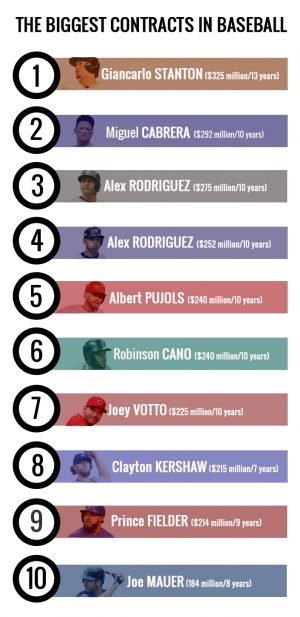Are long term MLB deals a good idea?
With star outfielder Bryce Harper signing for 13 year and $330 million shortly after Manny Machado inked a 10 year, $300 million contract, a standard has been set in the MLB that star players should sign huge, long term deals. For players, the desire for long term contracts is understandable. With guaranteed money, family stability, and no stress of free agency, every star free agent is looking for a long term deal. But are these monster contracts good for teams and fans?
One long term deal that was clearly a mistake is the 10 year, $240 million contract shelled out to slugger Albert Pujols. According to ESPN insider, this contract earned the Los Angeles Angels a grand total of -15.7 wins. How could such a star player be so terrible? The answer is easy: age. It seems like in the free agent era, age is a huge factor. Former Cy young Dallas Keuchel is currently unsigned, largely because he is 31 years old. However, when it comes to long term deals, age seems to be less of an issue. For example, Bryce Harper will be 31 before his contract is halfway done. This problem with age is often overlooked when giving huge, decade long contacts to young stars.

Another problem with huge contracts is that they cost a lot of money. This may seem like the whole point of the contracts, but these mega deals are a big reason that solid infielders like MikeMoustakas, José Iglesias and Josh Donaldson had to sign one year or minor league deals. In modern free agency, there are huge sweepstakes to sign the so-called stars, while the solid to good players either sign shorter, less desirable contracts (Moustakas, Iglesias, and Donaldson) or hold out in hopes of a great last minute offer (Craig Kimbrel, Dallas Keuchel). This not only hurts these players who are just below superstar status, but hurts the teams that do pay a boatload of money to the stars. In the long run, these teams will not have enough money to surround their new franchise player with a supporting cast of world series caliber players.
This troubling, new form of free agency may be soon coming to an end soon. Not only have veterans such as Justin Verlander and Adam Wainwright heavily criticized the recent free agent markets (Verlander tweeted that the “system is broken” and Wainwright alluded to the possibility of a strike in an interview with St. Louis radio station TMASTL), but meetings have intensified with MLB union representative Tony Clark, who predicts major changes coming in the next few offseasons.



